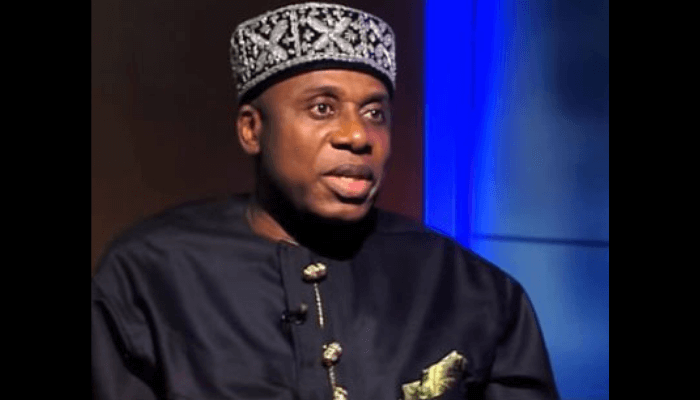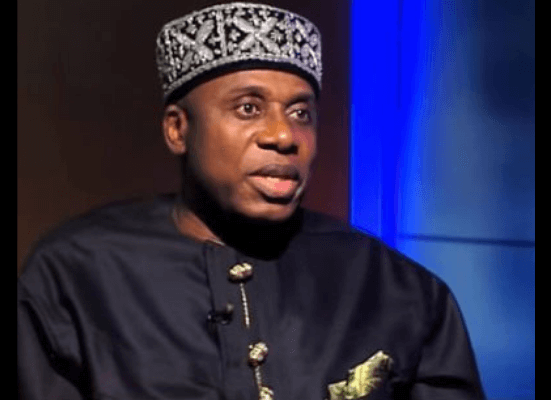Former Minister of Transportation, Rotimi Amaechi, has pledged his full support for any presidential candidate who emerges from the African Democratic Congress (ADC) ahead of the 2027 general elections. Speaking to a large crowd of supporters in Port Harcourt, Amaechi emphasized that all members of the opposition coalition backing the ADC are committed to rallying behind a single flagbearer through a transparent and credible primary process.
According to Amaechi, the time has come for Nigerians to unite behind a political alternative capable of alleviating the economic hardship and growing insecurity plaguing the country. “If you’re not tired of President Tinubu, I am. If you’re not hungry, I am,” he said. “The ADC is here to make Nigerians happy. Let us remove this government and stop the hunger everyone is suffering from.”
The former Rivers State governor, who walked three kilometers from the Port Harcourt International Airport to his residence in what many interpreted as a direct challenge to FCT Minister Nyesom Wike, urged his supporters and all residents of Rivers State to register with the ADC in preparation for the 2027 elections. He warned against electoral malpractice in the state and vowed not to work with anyone who colludes in manipulating results.
In a show of growing grassroots support, the Non-Indigenes Alliance Movement (NIAM), Port Harcourt chapter, also declared its readiness to back the ADC’s eventual presidential nominee. The group’s leader, Chief Mike Oyiakhire, said the ADC represents a break from the APC’s “years of bad governance” and that the goal is to use democratic means to dethrone the ruling party in 2027.
Meanwhile, ADC National Publicity Secretary, Bolaji Abdullahi, criticized the Tinubu administration for failing to deliver on the promised benefits of its economic reforms. In an interview on Channels Television, he described a widening gap between government rhetoric and the reality experienced by most Nigerians. “Policies have been announced, but the people are still suffering,” Abdullahi said. “The fuel subsidy has been removed, yet there is no clear plan for how the savings are improving ordinary lives.”
He questioned how the disbursed subsidy savings are being used, citing the rising cost of living and lack of improvement in public services such as healthcare and transportation. “If I’m paying ₦1,000 for petrol, I should at least get free or affordable healthcare as a result. But we don’t see that,” he added.
While the Presidency refused to directly engage with the opposition’s criticisms, a source within the administration maintained that the policies of the Tinubu-led government are beginning to yield positive results and that long-term benefits would soon become more visible.
In a related development, former Jigawa State governor and senior Peoples Democratic Party (PDP) figure, Sule Lamido, expressed willingness to support any serious political effort aimed at rescuing Nigeria but firmly rejected joining the ADC or its coalition. Speaking to journalists in Kano, Lamido argued that the ADC alliance is composed of individuals rather than structured political institutions. He stressed that without a clear ideological and institutional foundation, such a coalition would lack staying power.
Lamido went further to accuse the Tinubu administration of weakening Nigeria’s democracy by using state institutions to coerce opposition members. He pointed to the case of former Delta State Governor Ifeanyi Okowa, alleging that corruption charges against him were dropped after he defected to the APC, echoing past accusations that the ruling party provides political cover for those willing to switch allegiance.
“We no longer have the Nigeria we did 25 years ago,” Lamido lamented. “There’s no unity, no trust, and no respect between the country’s components. This administration is deepening divisions to serve its own interests. Our democracy is under threat.”
As political alliances begin to take shape ahead of 2027, both the ADC and elements of the traditional opposition are positioning themselves as alternatives to the current ruling party. However, questions remain about how unified and structured these coalitions will be, and whether they can translate dissatisfaction with the government into electoral victory.


